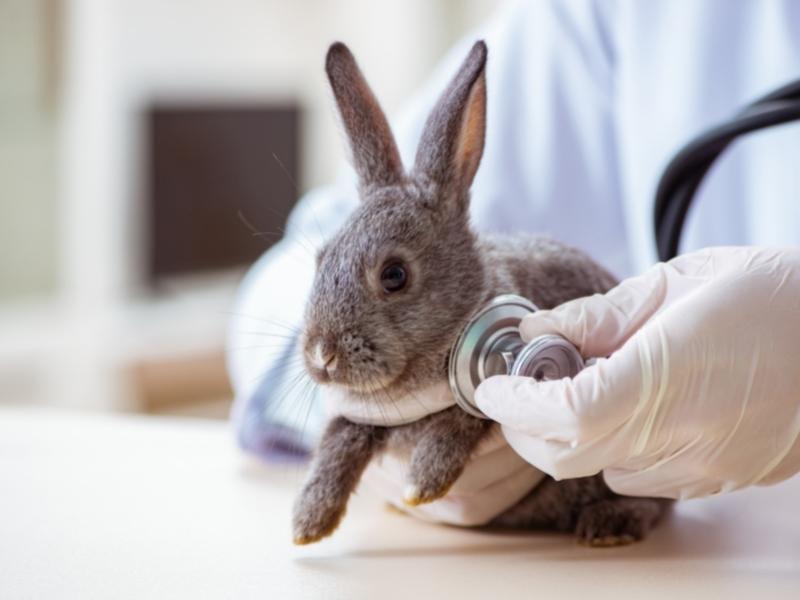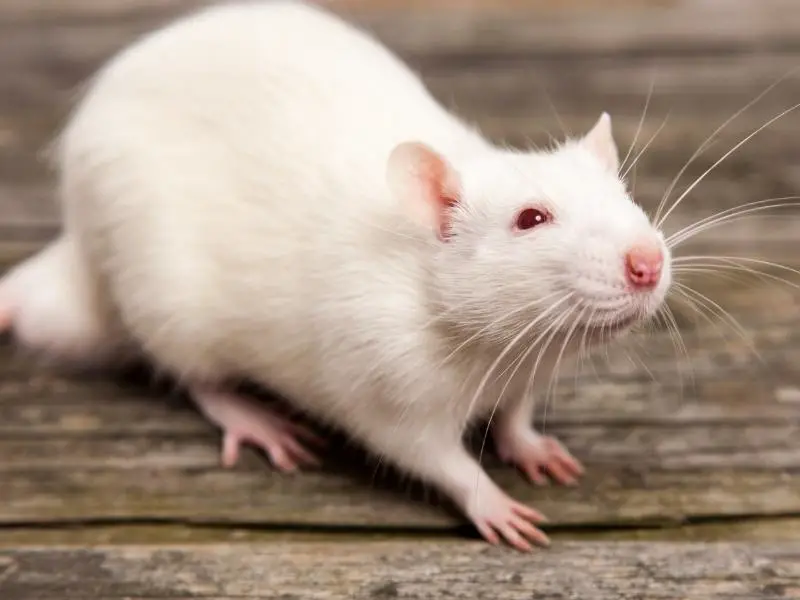Have you ever cleaned your rabbit’s hutch and found a dead mouse under their bedding? Are you now wondering if your rabbit is perhaps killing the mice for food?
So do rabbits eat mice, and is it wise for them to do so?
Rabbits don’t eat mice. A rabbit is a herbivore, meaning its diet consists of plants, grass, and hay. Their fragile digestive system is not capable of digesting meat. Rabbits are territorial animals and can accidentally kill a mouse by biting or kicking it. But a rabbit won’t eat a dead mouse.
If you’ve noticed mice moving in and out of your rabbit’s hutch, and you’re concerned about your bunny’s safety, this guide will give you all the information you’ll need to keep your bun healthy and safe.
Will Rabbits Eat a Mouse?
If your bun is feeling territorial, they’re capable of killing a mouse. However, your rabbit won’t try to eat rats, mice, or field mice. This goes for domestic and wild rabbits.
Let’s take a closer look at some of the reasons why your rabbit won’t eat a mouse:
No Nutritional Benefits
Your rabbit is a herbivore (plant eater), and its diet consists of Timothy grass hay, pellets, and leafy vegetables that provide them with all the necessary nutrients.
Ingesting meat from a mouse serves no purpose and provides no nutritional benefits for your rabbit.
The high protein levels found in mice meat will cause your bun to have an upset stomach (diarrhea and gas build-up).
Not a Predator
Rabbits are prey animals (predators hunt them). Their instinct is to run away from danger, not to hunt down other animals, such as mice or rats, for food. Your floppy-eared companion has no desire to eat meat.
Rabbits prefer food that doesn’t run away from them, such as:
- Timothy grass hay
- Fresh leafy green vegetables and fruit
- Good-quality pellets
- And the occasional treat
Teeth for Eating Plants
Another reason why rabbits don’t eat mice is that their teeth are designed for chewing and chomping up plant matter. Your bun’s teeth aren’t designed to tear up meat or gnaw on bones (like a dog or cat).
If your bun accidentally ingests meat, it would cause a blockage in its fragile digestive tract as it can’t break down or digest the mouse.
Dangers When Rabbits Eat Mice

Here’s a look at some of the potential dangers involved when bunnies eat mice (which is very rare):
- Your bun is susceptible to contracting various diseases and parasites that the mice are carrying.
- A rabbit can choke on the mouse, as their teeth aren’t designed to break down flesh or bones. This can also lead to intestinal blockage and digestive issues such as gastrointestinal stasis.
- Many people make use of pesticides to eliminate rodent infestations. The mouse may have eaten this poison, which will, in turn, poison your rabbit if consumed.
Disease Rabbits Can Get From Mice
Not only are mice troublesome pests that leave droppings and urine everywhere they go, but these pesky rodents also spread an array of diseases to other animals, such as your bunny.
Here’s a closer look at some of the diseases rabbits can get from mice:
Hantavirus
Hantavirus is a hemorrhagic disease that is transmitted to rabbits by inhaling dry mouse droppings and urine. This is a serious disease that can lead to respiratory failure.
A few symptoms of Hantavirus are:
- Diarrhea
- Difficulty breathing
- Loss of appetite
- Obvious lethargy
Salmonella
Another severe disease is Salmonella, caused by bacteria and dirt that a mouse brings in on their paws and fur. When they move around your rabbits’ living environment, they contaminate surfaces and your bun’s food.
A few symptoms of Salmonella are:
- Diarrhea
- Hunched over in pain
- Loss of appetite
- Lethargy
Lyme Disease
Ticks spread Lyme disease. Mice and field mice live in grassy areas and easily carry ticks.
The ticks will attach themselves to your rabbit to feed, causing Lyme disease. This is a very serious disease that can be fatal.
A few symptoms of Lyme disease are:
- Red and inflamed skin
- Unsteady on their feet
- Obvious lethargy
- Loss of appetite
Lymphocytic Choriomeningitis (LCMV)
LCMV is a nasty virus that is spread through fresh mouse droppings, saliva, and urine. This viral infection causes inflammation of the meninges (surrounds the brain and spinal cord), which can be life-threatening for your bunny.
A few symptoms of LCMV are:
- Rapid loss of weight
- Sneezing and sniffles
- Sensitivity to light
- Diarrhea
If your bun shows any of these symptoms, and you know there have been mice in their living environment, it would be best if you got your rabbit to the vet as soon as possible.
Do Rabbits Keep Mice Away?
Unfortunately, rabbits are no good at keeping mice away, mainly due to their soft and docile nature. Rabbits aren’t predators and usually aren’t aggressive unless provoked. In this case, they might kick or nip at a mouse.
Instead of keeping mice away, rabbits will attract them (unintentionally) due to the smell of their droppings, pellets, and any uneaten food.
As a bunny owner, it’s your job to keep the mice away from your rabbit.
Let’s take a quick look at a few tips on how to keep mice (and rats) away:
1. Clean your rabbits’ living environment daily, and ensure to change their litter box regularly (mice eat rabbit poop as well).
2. Store your rabbit food and hay in an air-tight container where rodents can’t reach.
3. Scrub your bun’s hutch with a bunny-safe cleaner such as vinegar and water. This will eliminate some of the urine odors that attract mice.
4. Ensure your garbage bags are tightly sealed and discarded.
My Last Bunny Thoughts
These two cute animals would live together in perfect harmony in an ideal world. Pet rabbits are such lovely and warm animals that they don’t mind having mice living with them (as long as they don’t disturb their babies).
Allowing mice into your rabbit’s living environment is a big mistake. These (although cute) rodents come with a lot of baggage! Issues range from poor toilet manners (leaving poop and urine everywhere) to carrying some very serious diseases and unwelcome parasites.
Your bun will certainly not chase them away, let alone eat these mice to protect their home. So it’s your duty as a bunny parent to keep these “disease carriers” out of your rabbit’s hutch and environment.
Related Articles:

